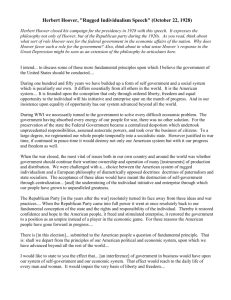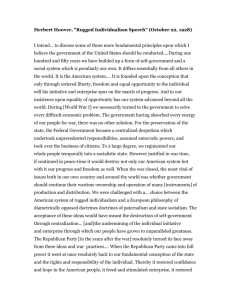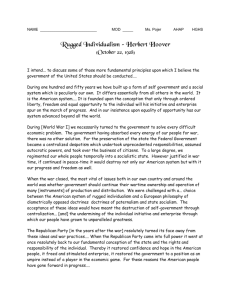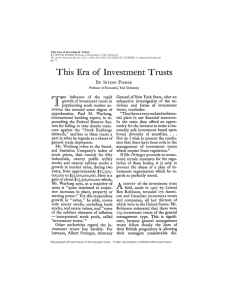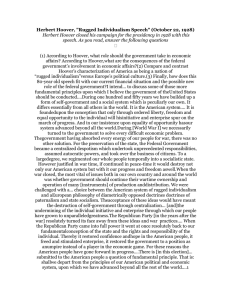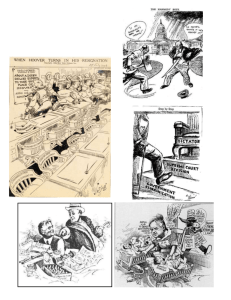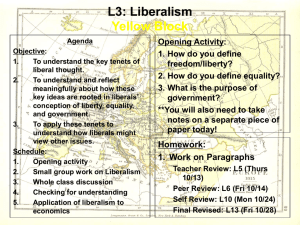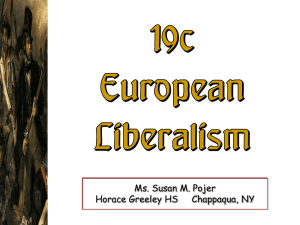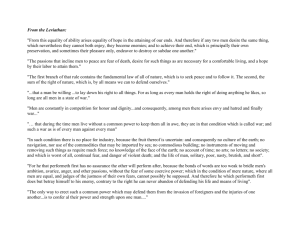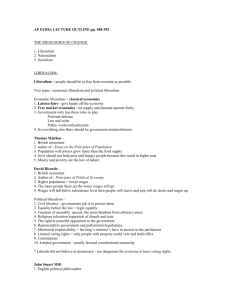Reading - Rugged Individualism
advertisement
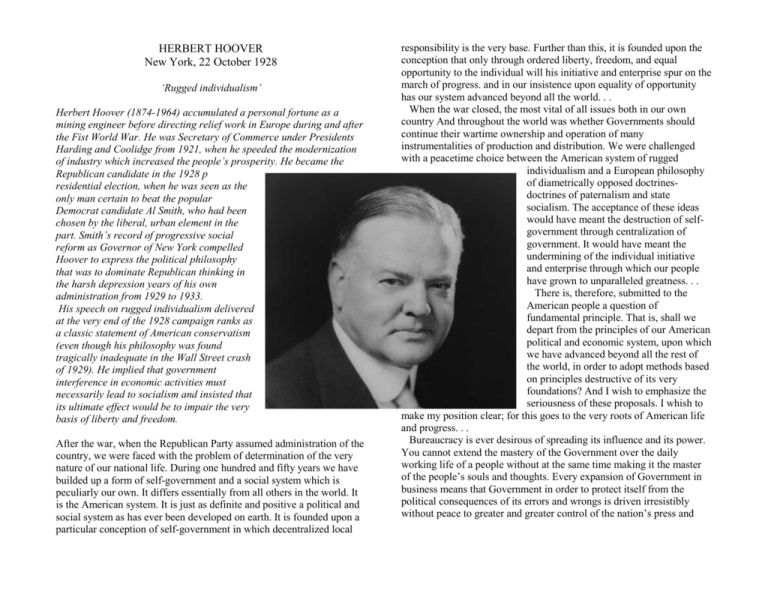
HERBERT HOOVER New York, 22 October 1928 ‘Rugged individualism’ Herbert Hoover (1874-1964) accumulated a personal fortune as a mining engineer before directing relief work in Europe during and after the Fist World War. He was Secretary of Commerce under Presidents Harding and Coolidge from 1921, when he speeded the modernization of industry which increased the people’s prosperity. He became the Republican candidate in the 1928 p residential election, when he was seen as the only man certain to beat the popular Democrat candidate Al Smith, who had been chosen by the liberal, urban element in the part. Smith’s record of progressive social reform as Governor of New York compelled Hoover to express the political philosophy that was to dominate Republican thinking in the harsh depression years of his own administration from 1929 to 1933. His speech on rugged individualism delivered at the very end of the 1928 campaign ranks as a classic statement of American conservatism (even though his philosophy was found tragically inadequate in the Wall Street crash of 1929). He implied that government interference in economic activities must necessarily lead to socialism and insisted that its ultimate effect would be to impair the very basis of liberty and freedom. After the war, when the Republican Party assumed administration of the country, we were faced with the problem of determination of the very nature of our national life. During one hundred and fifty years we have builded up a form of self-government and a social system which is peculiarly our own. It differs essentially from all others in the world. It is the American system. It is just as definite and positive a political and social system as has ever been developed on earth. It is founded upon a particular conception of self-government in which decentralized local responsibility is the very base. Further than this, it is founded upon the conception that only through ordered liberty, freedom, and equal opportunity to the individual will his initiative and enterprise spur on the march of progress. and in our insistence upon equality of opportunity has our system advanced beyond all the world. . . When the war closed, the most vital of all issues both in our own country And throughout the world was whether Governments should continue their wartime ownership and operation of many instrumentalities of production and distribution. We were challenged with a peacetime choice between the American system of rugged individualism and a European philosophy of diametrically opposed doctrinesdoctrines of paternalism and state socialism. The acceptance of these ideas would have meant the destruction of selfgovernment through centralization of government. It would have meant the undermining of the individual initiative and enterprise through which our people have grown to unparalleled greatness. . . There is, therefore, submitted to the American people a question of fundamental principle. That is, shall we depart from the principles of our American political and economic system, upon which we have advanced beyond all the rest of the world, in order to adopt methods based on principles destructive of its very foundations? And I wish to emphasize the seriousness of these proposals. I whish to make my position clear; for this goes to the very roots of American life and progress. . . Bureaucracy is ever desirous of spreading its influence and its power. You cannot extend the mastery of the Government over the daily working life of a people without at the same time making it the master of the people’s souls and thoughts. Every expansion of Government in business means that Government in order to protect itself from the political consequences of its errors and wrongs is driven irresistibly without peace to greater and greater control of the nation’s press and platform. Free speech does not live many hours after free industry and free commerce die. It is a false liberalism that interprets itself into the Government operation of commercial business. Every step of bureaucratizing of the business of our country poisons the very roots of liberalism that is, political equality, free speech, free assembly, free press, and equality of opportunity. It is the road not to more liberty but to less liberty. Liberalism should be found not striving to spread bureaucracy but striving to set bounds to it. True liberalism seeks all legitimate freedom, first in the confident belief that without such freedom the pursuit of all other blessings and benefits is vain. That belief is the foundation of all American progress, political as well as economic. Liberalism is a force truly of the spirit, a force proceeding from the deep realization that economic freedom cannot be sacrificed if political freedom is to be preserved. Even if governmental conduct of business could give us more efficiency instead of less efficiency, the fundamental objection to it would remain unaltered and unabated. It would destroy political equality. It would increase rather than decrease abuse and corruption. It would stifle initiative and invention. It would undermine the development of leadership. It would cramp and cripple the mental and spiritual energies of our people. It would extinguish equality and opportunity. It would dry up the spirit of liberty and progress. For these reasons primarily it must be resisted. For a hundred and fifty years liberalism has found its true spirit in the American system, not in the European systems. . . Our people have the right to know whether we can continue to solve our great problems without abandonment of our American system. I know we can. We have demonstrated that our system is responsive enough to meet any new and intricate development in our economic and business life. We have demonstrated that we can meet any economic problem and still maintain our democracy as master in its own house and that we can at the same time preserve equality of opportunity and individual freedom. . . And what have been the results of our American system? Our country has become the land of opportunity to those born without inheritance, not merely because of the wealth of its resources and industry, but because of this freedom of initiative and enterprise. Russia has natural resources equal to ours. Her people are equally industrious, but she has not had the blessing of one hundred and fifty years of our form of government and of our social system. By adherence to the principles of decentralized self-government, ordered liberty, equal opportunity, and freedom to the individual our American experiment in human welfare has yielded a degree of wellbeing unparalleled in all the world. It has come nearer to the abolition of poverty, to the abolition of fear of want, than humanity has ever reached before. Hoover beat Smith but was reluctant to extend federal power during the depression and was decisively beaten by Franklin Delano Roosevelt in 1932 election.
